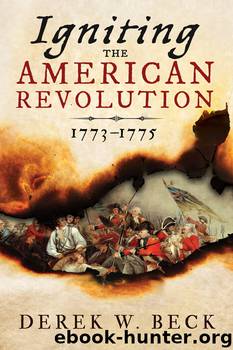Igniting the American Revolution by Derek W. Beck

Author:Derek W. Beck
Language: eng
Format: epub
Publisher: Sourcebooks, Inc
Published: 2015-11-15T05:00:00+00:00
CHAPTER 11
The Spreading Flames of Rebellion
The current political debate was by no means limited to the provincial leaders. As the public debate heated up, the sensationalistic Massachusetts press was fast at work, eager to stir up readers’ passions for liberty. However, publication of incendiary propaganda was not without risk. Isaiah Thomas, editor of the Massachusetts Spy (Or, American ORACLE of Liberty!) in Boston, had wisely packed up his press and printing types just two days before the recent Battle of the Nineteenth of April and smuggled them out of the town. He set up shop in Worcester, where he continued to publish his strongly pro-Whig newspaper with the motto “Americans!—Liberty or Death!—Join or Die!”1
Benjamin Edes, one of two printers of the Boston Gazette, was not as sagacious and so found himself in besieged Boston. He nevertheless escaped by boat at night, much as Paul Revere had, crossing the Charles into Charlestown. Edes made his way to Watertown and there continued printing his news on a battered old press. His partner, John Gill, remained in Boston and was surprisingly left unmolested for months, before he was finally arrested and put in jail, “charged with printing sedition, treason and rebellion.”2
One of the greatest strokes in the propaganda war came from Ezekiel Russell, printer of the Salem Gazette. He issued a famous and dramatic broadside by giving another American account of the recent battle and prominently featuring forty black coffins at the top of the page with the names of the deceased countrymen by each. It was memorably titled, “Bloody Butchery, by the British Troops; or the Runaway Fight of the Regulars”. He offered it to New Englanders “either to frame and glass, or otherwise preserve in their houses…as a perpetual memorial”.3
Yet despite all of this, and despite the looming war, Gage largely tolerated and allowed the freedom of the press, even though most of the articles were scathingly written against him. Instead of evoking censorship, he sought to combat the sensationalism with his own version of the events.
The most obvious means at his disposal to effect his counterattack in the propaganda war was via the few Loyalist newspapers. However, of Boston’s two admittedly Loyalist newspapers, the Boston Post-Boy shut down just before the battle, while the editor of the Boston News-Letter waffled for fear of reciprocity and ultimately failed to publish anything of value to the Loyalist cause before also being shut down in early 1776.4 Thus, Gage was forced to publish his own broadside, A Circumstantial Account of an Attack that happened on the 19th April, 1775, intended to be widely published, partly to combat the American sensationalism and partly to fill the void the Tory papers had left behind.
He sent it to all the continent’s royal governors, as well as to many New England printers who in turn dispersed it to the masses. However, his account failed to achieve the desired effect. While pro-Whig accounts gave impassioned appeals to heaven and carefully constructed rhetoric against the unbridled authority of their
Download
This site does not store any files on its server. We only index and link to content provided by other sites. Please contact the content providers to delete copyright contents if any and email us, we'll remove relevant links or contents immediately.
| Africa | Americas |
| Arctic & Antarctica | Asia |
| Australia & Oceania | Europe |
| Middle East | Russia |
| United States | World |
| Ancient Civilizations | Military |
| Historical Study & Educational Resources |
Cat's cradle by Kurt Vonnegut(15115)
Pimp by Iceberg Slim(14237)
4 3 2 1: A Novel by Paul Auster(12235)
Underground: A Human History of the Worlds Beneath Our Feet by Will Hunt(11986)
The Radium Girls by Kate Moore(11877)
Wiseguy by Nicholas Pileggi(5618)
Perfect Rhythm by Jae(5283)
American History Stories, Volume III (Yesterday's Classics) by Pratt Mara L(5218)
The Fire Next Time by James Baldwin(5207)
Paper Towns by Green John(5032)
Pale Blue Dot by Carl Sagan(4867)
A Higher Loyalty: Truth, Lies, and Leadership by James Comey(4803)
The Mayflower and the Pilgrims' New World by Nathaniel Philbrick(4385)
The Doomsday Machine by Daniel Ellsberg(4380)
Killers of the Flower Moon: The Osage Murders and the Birth of the FBI by David Grann(4355)
The Sympathizer by Viet Thanh Nguyen(4269)
Too Much and Not the Mood by Durga Chew-Bose(4237)
The Borden Murders by Sarah Miller(4197)
Sticky Fingers by Joe Hagan(4071)
